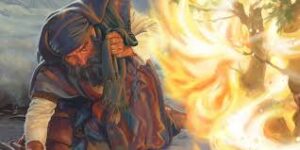Who Am I That I Should Go to Pharaoh
3: 11-12
Who am I that I should go to Pharaoh DIG: How does Moses reply? Is he more unsure of himself or of God? Why? What did Moses have to learn before the LORD would send him back to Egypt?
REFLECT: Do you believe that God is with you when you are confronting dangers in your life? Does He always give a sign like He gave Moses? Why? Why not?
The life of Moses can be separated into three forty-year periods. Forty years in Egypt, forty years in Midian, and forty years in the wilderness. In the first forty years, God showed what He could do with a man who thought he was something. In the second forty years, God showed what He could do with a man who thought he was nothing. And in the last forty years, God showed what He could do with a man who had learned both lessons well.
Therefore, Moses at eighty was not as rash as he was at forty. When he was forty, he was cocky and almost arrogant. He killed an Egyptian and thought his act would be understood by the Jews. He thought he could deliver Isra’el all by himself. But he found out that he could not. God took him to the backside of the desert for special training. Now at eighty he wasn’t so anxious. He had learned how weak he was. Therefore, now Moshe and ADONAI begin a series of objections and answers. Moses raised five objections as to why God should not use him because he didn’t understand that God does not call the equipped, He equips the called.

Moses said to God, “Who am I, that I should go to Pharaoh and bring the Israelites out of Egypt (3:11)?” At that point, ADONAI could use him. At forty, he thought he was something, but now at eighty he thought he was nothing. He repeatedly called into question his own abilities and conveyed a lack of confidence. This is God’s way of training all of His men and women. God had to take the boy David who could slay a giant and put him out into caves where he was hunted like an animal until he found out how weak he was. Then God could make him a king.
Elijah the prophet was brave enough to walk right into the court of Ahab and Jezebel and tell them that there will be neither dew nor rain in the next few years except at my word (First Kings 17:1b). But Elijah was not as brave as he seemed. God put him out in the desert where He trains men and he found out that he was nothing and the LORD was everything. When Elijah realized this, God used him to face the prophets of Baal and bring down fire from heaven (First Kings 18:16-40).
Rabbi Sha’ul put it this way: That is why, for Messiah’s sake, I delight in weaknesses, in insults, in hardships, in persecutions, in difficulties. For when I am weak, then I am strong (Second Corinthians 12:10). This is certainly a paradox. It is, however, what ADONAI was teaching Moses. When Moshe learned that he could not deliver Isra’el, but that God could do it through him, ADONAI was ready to use him.50
This applies to us today. The LORD cannot use us when we think we are strong. It is out of weakness that we are made strong in Christ. The Rabbi Sha’ul said: But God chose the foolish things of the world to shame the wise; God chose the weak things of the world to shame the strong (First Corinthians 1:27). Moses and Sha’ul eventually understood that God could not use them unless they were weak. God can do amazing things through a weak person.
ADONAI answered Moses from the burning bush and said: I will be with you. And this will be the sign to you that it is I who have sent you: When you have brought the people out of Egypt, you will worship God on this mountain (3:12). God provided Moshe with a sign of evidence. In the future, Moses’ flock of two to three million would worship ADONAI on the very place that he was standing. When Moshe saw the whole camp of Isra’el worshiping God at the foot of Mount Sinai, he would know who he was and that God would have indeed used him. This was indeed a sign because Sinai is not in a direct route from Egypt to Canaan. It was about one hundred and fifty miles out of the way. But they would take that route and that would serve as a sign to Moses that the LORD really did send him. However, this would lead to a second objection.



Leave A Comment